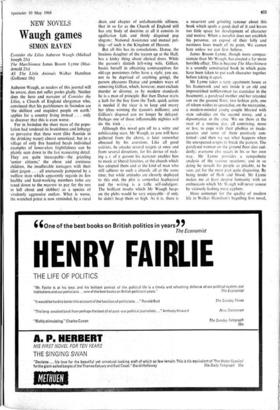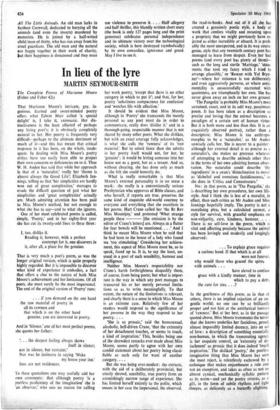NEW NOVELS
Waugh games
siMON RAVEN The Marchioness James Broom Lynne (Mac- donald 21s) All The Little Animals Walker Hamilton (Gollancz 18s) Auberon Waugh, as readers of this journal will be aware, does not suffer proles gladly. Neither does the hero and narrator of Consider the Lilies, a Church of England clergyman who, convinced that his parishioners in Swindon are 'the shiftiest and stupidest people on earth,' applies for a country living instead . . . only to discover that this is even worse.
For in Swindon the sheer mass of the popu- lation had rendered its brutishness and lethargy so pervasive that these went (like fluoride in the drinking water) almost unnoticed; but in a village of only five hundred heads individual examples of lower-class frightfulness can be plainly seen down to the last nauseating detail. They are quite inescapable—the grizzling 'senior citizens,' the obese and cretinous children, the insufferable teenagers with their idiot jargon. . . all unctuously pampered by a welfare state which apparently regards its few healthy and hard-working members (who are taxed down to the marrow to pay for the rest to loll about and slobber) as a species of virulently aggressive outlaw. What is worse, the wretched priest is now reminded, by a rural dean, and chapter of unfathomable silliness, that in so far as the Church of England still has any body of doctrine at all it consists in egalitarian fads and thinly disguised pop slogans: National Assistance and mutual pet- ting—of such is the Kingdom of Heaven.
But all this has its consolations. Danae, the luscious daughter of the tycoon up at the Hall, has a kinky thing about clerical dress. While the parson's sluttish left-wing wife, Gillian, busies herself in obtaining contraceptives for old-age pensioners (who have a right, you see, not to be deprived of anything going), the parson pleasures Danae and ponders ways of removing Gillian, which, however, must exclude murder or divorce, as by modern standards he is a man of principle. But then Danae starts a lech for the boy from the Tech, quick action is needed if the vicar is to keep and marry her (thus winning the tycoon's millions), and Gillian's disposal can no longer be delayed. Perhaps one of those inflammable nighties will do the trick . . .
Although this novel gets off to a witty and exhilarating start, Mr Waugh, as you will have gathered from the above, is later somewhat obsessed by his aversions. Like all good satirists, he attacks several targets at once and from several directions, for his device of mak- ing a c of E parson his narrator enables him to mock at liberal fatuities, at the church which has adopted them and at the kind of man who still adheres to such a church, all at the same time; but while attitudes are cleverly deployed -to this end, the plot is somewhat haphazard and the writing is a trifle self-indulgent. The brilliant insults which Mr Waugh heaps on the plebs would be very enjoyable—if only he didn't heap them so high. As it is, there is a recurrent and grinding rancour about this book which spoils a good deal of it and leaves too little space for development of character and motive. When a novelist does not establish his personae, an expose of their folly and nastiness loses much of its point. We cannot hate unless we can first believe.
James Broom Lynne, though more compas- sionate than Mr Waugh, has created a far more horrible effect. This is because The Marchioness is a soundly constructed book in which pains have been taken to put each character together before taking it apart.
Mr Lynne takes a tatty apartment house as his framework and sets inside it an old and impoverished noblewoman (as caretaker in the basement), a paralysed mother and her retarded son on the ground floor, two lesbian girls, one of whom wishes to apostatise, on the mezzanine, a modern-minded young couple bloated with state subsidies on the second storey, and a dipsomaniac in the attic. We see them at the start of a routine day, all contriving, more or less, to cope with their phobias or inade- quacies and some of them positively con- tented—and then we see what happens when the unexpected erupts to break the pattern. The paralysed woman on the ground floor dies sud- denly; everyone else reacts in his or her own way. Mr Lynne provides a sympathetic analysis of the various reactions; and in so doing he reveals his people as pitiable, to be sure, yet for the most part quite disgusting. By being tender of flesh and blood, Mr Lynne makes me at least despise humanity with an enthusiasm which Mr Waugh will never arouse by viciously lashing mere cyphers.
More contempt for the quality of modern life in Walker Hamilton's beguiling first novel, All The Little Animals. An old man lurks in farthest Cornwall, dedicated to burying all the animals (and even the insects) murdered by motorists. He is joined by a half-witted child/man of thirty, who has run away from his cruel guardians. The old man and the natural are happy together in their work of charity, but their happiness is threatened and they must use violence to preserve it. . . . Half allegory and half thriller, this blandly written short story (the book is only 127 pages long and the print generous) celebrates personal independence and its ultimate victory over the technological society, which is here destroyed (symbolically) by its own cowardice, ignorance and greed. May I live to see it.







































 Previous page
Previous page